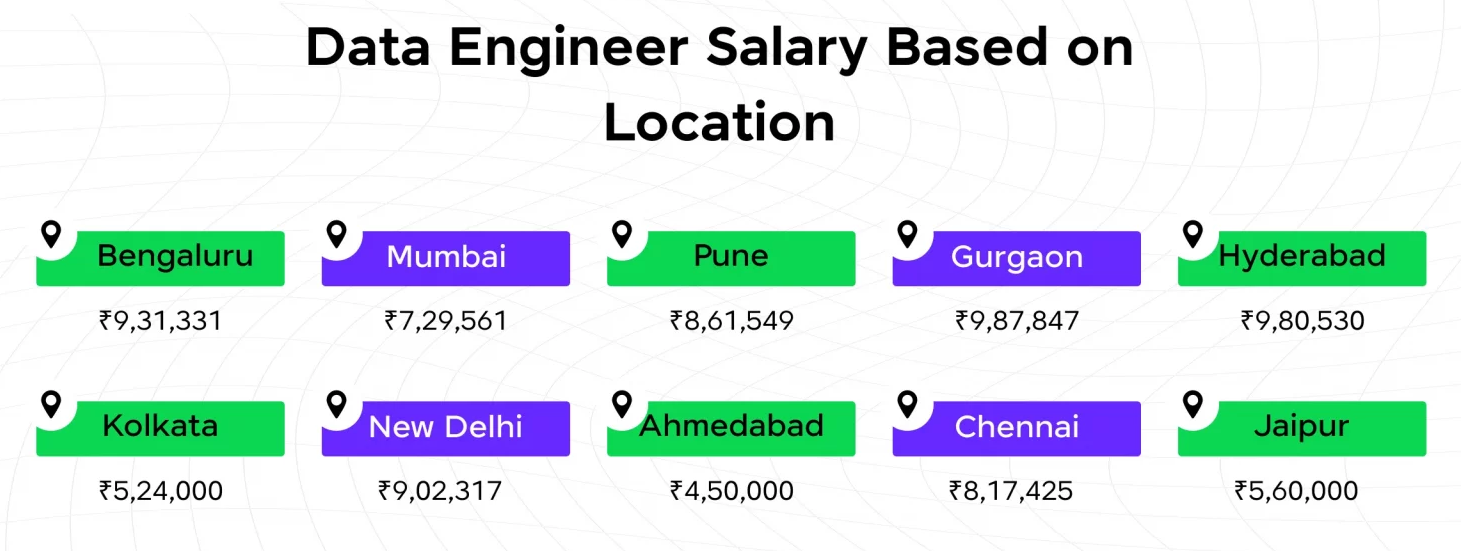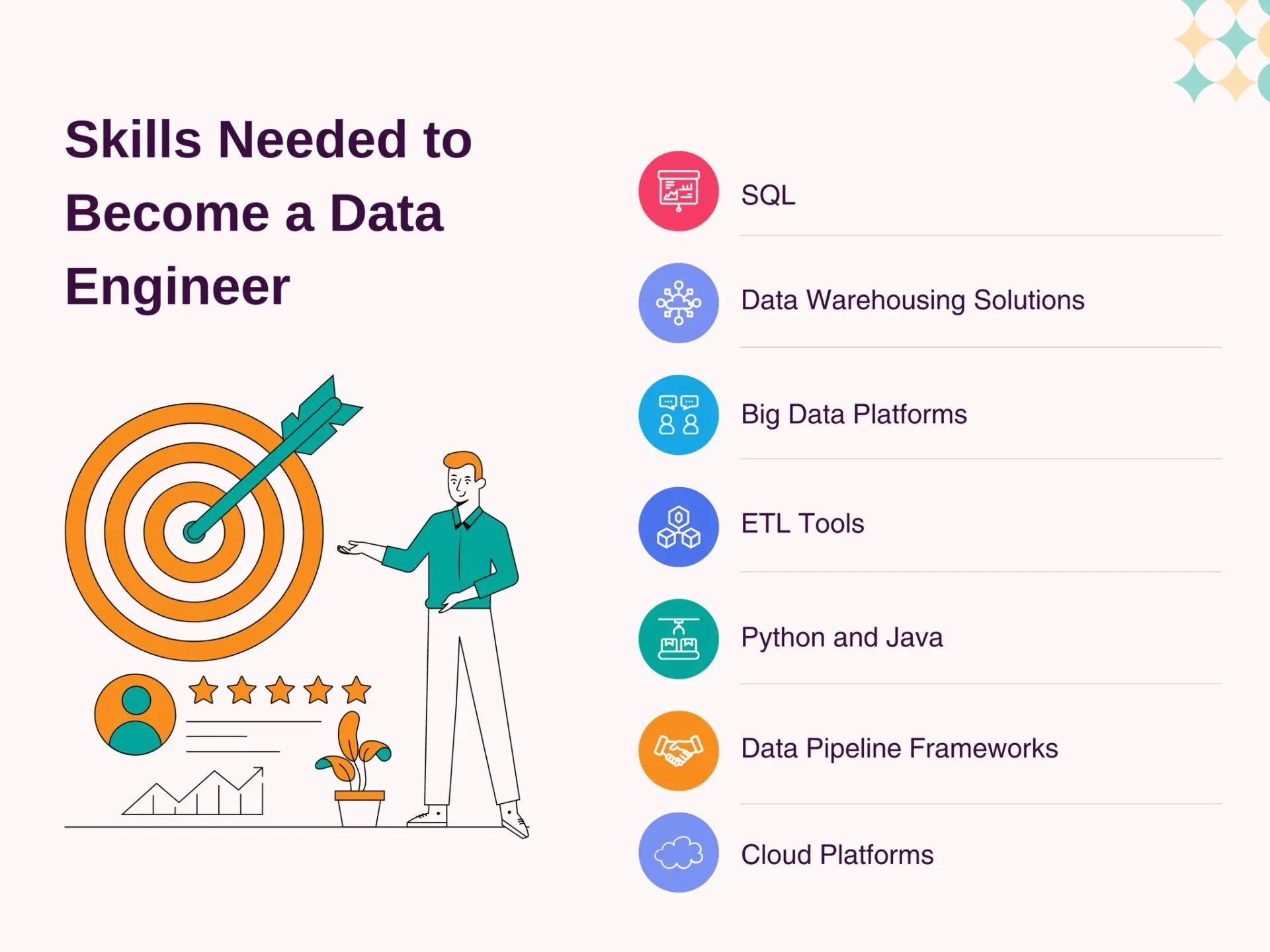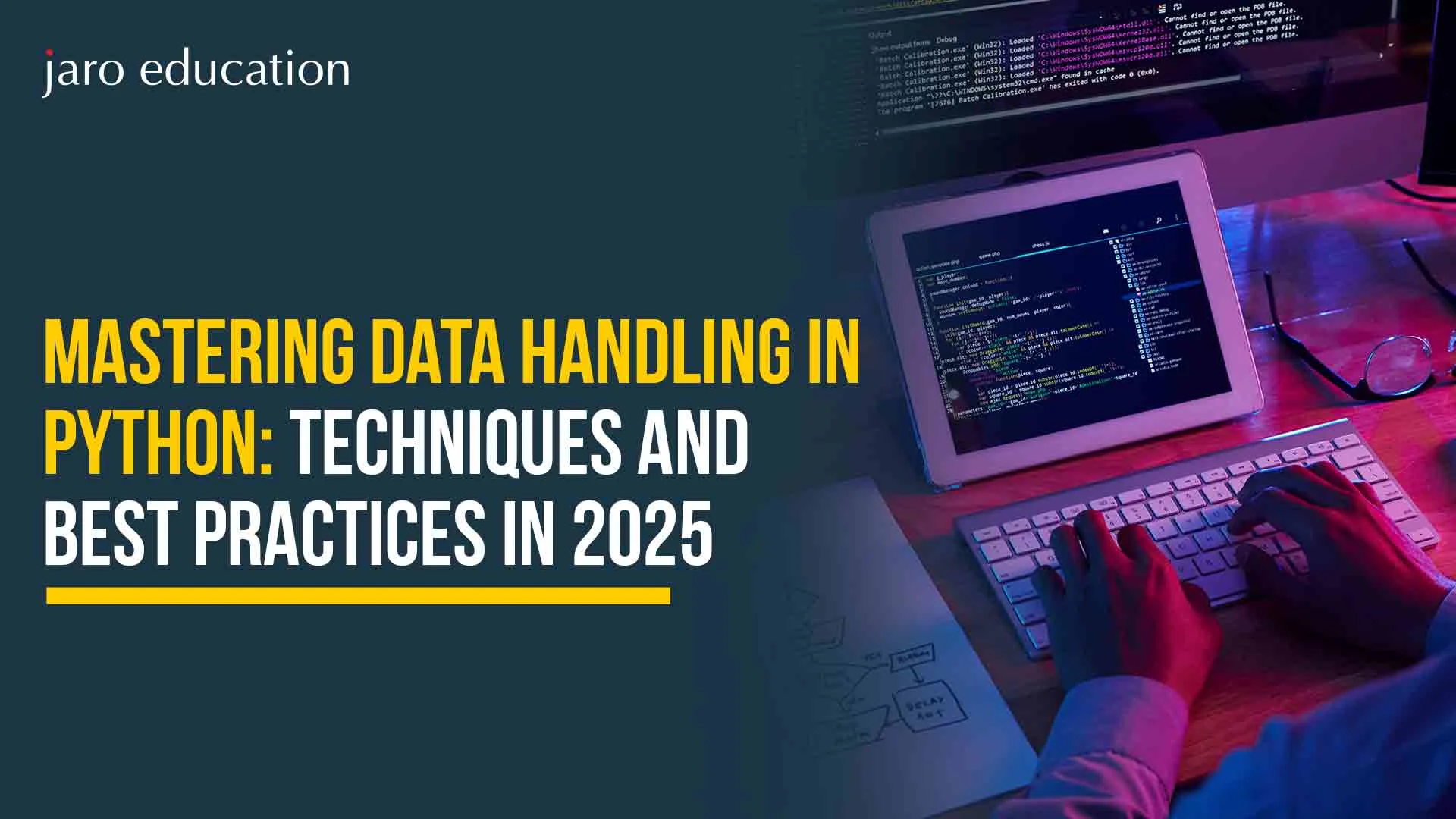Data Engineering Salary: Your 2026 Guide
Table of Contents

In an era where organizations are drowning in data, data engineers are the architects enabling insight, efficiency, and competitive edge. But how much do these specialists earn in 2026, especially in different levels and regions? This guide will walk you through everything.
So, let’s get started!
Data Engineer Salary in India: A Deep Dive for 2026

*guvi.in
The Indian tech landscape is the world’s primary hub for outsourcing and a massive product development market in its own right. The data engineer salary in India is seeing exponential growth, driven by product companies and Global Capability Centers (GCCs) offering compensation at near-global standards for top talent. Here’s a brief look:
| Experience Level | Average Base Data Engineer Salary (INR Lakhs per Annum) – 2026 Estimate |
| Entry-Level (0-2 Yrs) | ₹8,00,000 – ₹12,00,000 |
| Mid-Level (3-6 Yrs) | ₹15,00,000 – ₹25,00,000 |
| Senior Data Engineer (7+ Yrs) | ₹30,00,000 – ₹50,00,000+ |
| Big Data Architect (10+ Yrs) | ₹50,00,000 – ₹80,00,000+ |
Note: These figures represent base data engineer salaries and can be significantly higher with bonuses, performance incentives, and Employee Stock Ownership Plans (ESOPs) offered by high-growth startups and multinational product firms.
The Importance of Location in Data Engineer Salary
In India, a data engineer’s salary is heavily influenced by their city of employment. The major tech hubs, with their higher cost of living and greater concentration of high-paying product companies, offer superior packages.
- Bangalore (Bengaluru): Often called the “Silicon Valley of India,” it remains the highest-paying city. The presence of almost every major multinational technology company drives an extremely competitive salary market.
- Gurgaon/Delhi-NCR: A close second, especially for roles in Financial Technology (FinTech) and large enterprise GCCs.
- Hyderabad and Pune: Strong contenders with rapidly growing tech ecosystems, often presenting a better salary-to-cost-of-living ratio for mid-level professionals.
Data Engineer Salary in Senior Roles
Not all data engineering roles are created equal. Specialization in handling massive, complex datasets, known as Big Data, and ascending to a leadership position can drastically boost your earnings.
Big Data Engineer Salary
A big data engineer salary premium exists because the required skill set is specialized and crucial for enterprises dealing with data at the petabyte scale. These professionals build and manage the architecture for technologies like Hadoop, Spark, and Kafka.
The key to unlocking the Big Data premium lies in deep expertise with the Big Data ecosystem:
- Apache Spark: Essential for high-speed data processing.
- Apache Kafka: Core for real-time data streaming and event-driven architectures.
- NoSQL Databases: Experience with MongoDB, Cassandra, or HBase for handling unstructured data.
A Big Data Engineer, even at a mid-level, typically earns 15-20% more than a generalist Data Engineer in the same company due to the criticality and complexity of their work.
Senior Data Engineer Salary
The jump to a senior data engineer salary represents a transition from executing tasks to owning architecture and mentorship. A Senior Data Engineer’s value is tied to their ability to:
- Design and Scale: Architecting data warehouses and pipelines that can scale efficiently from a small pilot to enterprise-wide operations.
- Leadership & Mentorship: Guiding junior team members and defining best practices for data quality and governance.
- Cross-Functional Collaboration: Working directly with Data Scientists to prepare data for advanced models and communicating technical limitations to non-technical stakeholders.
In 2026, the senior-level salary will only be booming, with demand continuing to outpace supply, especially for those with over seven years of demonstrable, leadership-oriented experience.
Skills That Maximize Your Data Engineer Salary Potential

*a3logics.com
A high data engineer salary isn’t just a function of time served; it’s a direct reflection of the market value of your skill stack. To stay competitive in 2026 and beyond, focus on mastering the following three domains:
1. Cloud Mastery (The Infrastructure Layer)
Top Paying Skills: AWS Glue, Azure Data Factory, Google Cloud Dataflow, Terraform/CloudFormation.
Why it pays: The data infrastructure is the cloud. Demonstrable expertise in a single major cloud provider (preferably two) and its specialized data services is the single biggest factor affecting compensation.
2. Programming and Processing (The Engine)
Top Paying Skills: Python (PySpark), Scala, advanced SQL (optimization/tuning), Apache Spark, Kafka.
Why it pays: This is the core work. Fast, efficient, and resilient code is what prevents multi-million dollar data outages. Mastering Python’s data stack (Pandas, PySpark) for ETL/ELT is non-negotiable.
3. Data Architecture and MLOps (The Future)
Top Paying Skills: Data Mesh, Data Lakehouse architectures (Databricks, Delta Lake), Generative AI Data Pipelines, Kubernetes/Docker (for deployment).
Why it pays: The future of data is decentralized and AI-driven. Engineers who can bridge the gap between Data Engineering and Machine Learning (MLOps) by creating robust training and inference pipelines for AI models are in the highest demand. They are the ones turning data infrastructure into a strategic business asset, thus commanding the top pay brackets.
Career Acceleration with Jaro Education
For ambitious professionals aiming to secure a top-tier data engineer salary and future-proof their careers against the rapid changes in AI and Big Data, strategic upskilling is essential. Simply knowing SQL and Python is no longer enough to reach the senior and architect levels.
Jaro Education provides programs designed to bridge this exact skill gap, delivering executive-level education in collaboration with premier institutions. A standout offering is the Advanced Generative AI & Machine Learning Program with IITM Pravartak. This course is explicitly structured to take experienced professionals beyond traditional data engineering and into the bleeding edge of AI and ML. It covers critical, high-value subjects like:
- Generative AI Models and Architecture: Understanding how large language models (LLMs) and other generative models work, and more importantly, how to build the data pipelines that feed and fine-tune them.
- Data Preparation for ML: Deep diving into techniques for preparing vast, complex, and high-velocity datasets for optimal use in Machine Learning and AI workflows.
- Advanced Cloud Deployments: Focusing on scalable, production-ready MLOps practices using cloud tools, a key differentiator for senior data engineer salary negotiations.
This focused, institution-backed certification is precisely the kind of credential that separates a generalist engineer from a highly compensated, specialized AI Data Architect, making the investment a direct path to the premium data engineer salary.
Conclusion
The Data Engineer role is no fleeting trend; it is the backbone of the digital economy. As every company continues its evolution into a data-driven entity, the architects of that data, the Data Engineers, will see their value, and subsequently their data engineer salary, continue to climb.
By focusing your learning on cutting-edge tools and robust, scalable architectural design, you position yourself not merely to survive the coming technological shifts but to lead them, securing a high data engineer salary and prosperous career.
Frequently Asked Questions
What is the single biggest factor influencing a data engineer salary in 2026?
The biggest factor is Cloud Competency and Specialization. Proficiency in cloud-native data services (AWS, Azure, or GCP) and specialized tools like Snowflake or Databricks is the most reliable way to boost a data engineer salary. The more cloud platforms and specialized services you master, the higher your earning potential.
Is Big Data Engineer a separate role from Data Engineer, and does it pay more?
While often used interchangeably, a big data engineer is typically a specialization within Data Engineering, focusing exclusively on massive, complex datasets (petabytes of data). Yes, it generally pays more, often a premium of 15% to 20%, because it requires expert-level skills in distributed systems like Apache Spark, Hadoop, and Kafka.
How much experience is needed to qualify for a "senior data engineer salary"?
Generally, you need 5 to 7 years of hands-on experience to be considered for a senior data engineer salary. However, more important than years is the scope of your responsibility. Senior roles demand proven ability to design, own, and scale complex, end-to-end data architectures, mentor junior staff, and make crucial technology selection decisions.
What programming language is most crucial for a high data engineer salary?
Python and SQL are both crucial and non-negotiable foundations. However, mastery of PySpark (Python with Apache Spark) is what directly correlates with the highest salaries, as it demonstrates the ability to process and transform big data at scale using the industry’s most powerful framework.
Will Generative AI tools like ChatGPT decrease the demand for Data Engineers?
No, Generative AI will not decrease the demand; it will change the focus of the demand. AI models are entirely dependent on vast amounts of clean, well-structured data, and they require highly optimized data pipelines to run efficiently and securely. This shift is creating a new high-paying role: the AI Data Engineer or MLOps Engineer, who focuses on building the infrastructure for these AI systems.
















